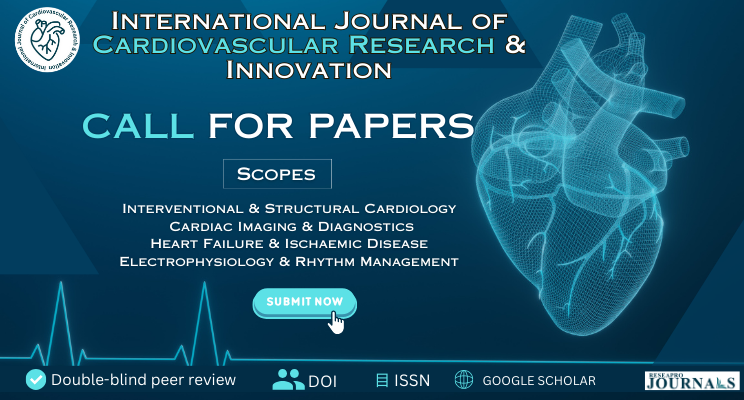
International Journal of Cardiovascular Research & Innovation (IJCRI) is a peer-reviewed, open-access, quarterly journal advancing rigorous, clinically meaningful work across the full spectrum of cardiology. We connect discovery science with translational and clinical practice to improve patient outcomes and inform guidelines.

Why Publish with IJCRI
- Clear clinical impact: We prioritise studies that change understanding, refine care pathways, or improve outcomes.
- Breadth + depth: From molecular mechanisms to systems of care, with strong coverage of interventional practice and imaging.
- Fair, fast decisions: Double-blind peer review with transparent editorial processes.
- Global relevance: Submissions welcomed from diverse settings, including resource-constrained environments and multi-centre collaborations.
Quick links: Author Guidelines· Submit Manuscript · Aims & Scope · Current Issue
Core Domains We Prioritise
Interventional & Structural Cardiology
- Device therapies, coronary physiology and revascularisation strategies
- Intravascular imaging/physiology, lesion preparation and stent optimisation
- Transcatheter valve interventions, structural heart procedures
- Early feasibility through post-market evaluations with clear patient selection, success criteria, and follow-up
Cardiac Imaging & Diagnostics
- Echocardiography, cardiac CT, cardiac MR, nuclear techniques
- Multimodality workflows that guide diagnosis, risk assessment, and therapy
- Studies detailing acquisition parameters, quality control, inter-reader reliability, and clinical pathways
Heart Failure & Ischaemic Disease
- Mechanisms, phenotyping, remote monitoring, pharmacotherapy, and device therapy
- Prevention, acute coronary care, cardiac rehabilitation, and secondary prevention
- Comparative-effectiveness designs and pragmatic trials reflecting routine care
Electrophysiology & Rhythm Management
- Atrial fibrillation and ventricular arrhythmias
- Ablation strategies, device programming, and long-term follow-up
- Outcomes that matter: stroke, hospitalisation, mortality, quality of life
Specialty Areas That Expand Our Reach
- Preventive Cardiology: risk assessment, lifestyle, pharmacologic prevention
- Hypertension & Vascular Disorders: diagnosis, home/ambulatory monitoring, therapeutic strategies
- Cardiac Surgery: coronary, valve, congenital, and aortic innovations with standardised operative definitions
- Genetics & Molecular Cardiology: inherited disease, genotype–phenotype links, omics, and functional validation
- Biomarkers & Novel Therapeutics: imaging and circulating markers, early-phase drug/device studies
- Digital Health & Remote Monitoring: AI decision support, telehealth models, virtual rehab, data security
- Public Health & Health Systems: epidemiology, equity, access, policy, reimbursement, and care-pathway innovation
What Our Editors Look For?
Clarity of contribution and reproducible methods. Strong submissions typically include:
- Defined research question & hypothesis with clinical or policy relevance
- Justified study design (trial, cohort, case–control, registry, basic science, etc.)
- Sampling strategy and inclusion/exclusion criteria with context (single vs. multi-centre)
- Sample size & power analysis (assumptions, effect sizes, α/β, interim analyses)
- Outcome measures that matter to patients and systems (e.g., mortality, stroke, device failure, readmissions)
- Data collection & quality assurance (CRFs/codebooks, monitoring, missing-data handling)
- Transparent analysis (model choice, variable handling, collinearity, sensitivity analyses)
- Bias reduction (randomisation, blinding, adjudication, inverse probability weighting)
- Equity & generalisability (subgroup analyses, diverse populations, site heterogeneity)
- Protocol registration and reporting standards (e.g., CONSORT, PRISMA, STROBE, STARD)
- Data/code availability where feasible, with privacy safeguards
Article Types We Welcome
- Original Research (4,000–6,000 words): novel findings, robust methods, and clinically meaningful endpoints
- Reviews (4,000–8,000 words): systematic/scoping with clear gaps and future agendas
- Short Communications (1,500–2,500 words): early signals—biomarkers, device feasibility, interim results
- Case Reports (1,500–3,000 words): educational value: unusual presentations, decision points, complications
- Method Primers: practical designs, reporting frameworks, open tools others can adopt
- Editorials, Narratives & Letters: timely perspectives that advance constructive dialogue
See full formatting details in the Author Guidelines (/author-guidelines).
Ethics & Peer Review
- Double-blind review: impartial assessment and constructive feedback
- Integrity first: required oversight and consent for human studies; conflict and funding disclosures
- Plagiarism screening and adherence to international editorial standards
- Transparent decisions: clear criteria; rapid first decisions without compromising depth
Global Relevance & Equity
- Open to studies from tertiary centres and community or resource-constrained settings
- Interest in implementation science—barriers, training, telemedicine, remote monitoring
- Encouragement of cross-disciplinary work (engineering, data science, rehabilitation, public health, economics) with direct clinical utility
How to Prepare a Strong Submission?
- One-paragraph contribution statement: what changes, for whom, and why
- Methods that a reader could replicate, including data definitions and endpoint adjudication
- Tables/figures that clarify key messages; consistent denominators and time points
- Sensitivity analyses and subgroup plans declared and justified
- Limitations that are specific and actionable (not boilerplate)
- Clinical or system implications stated plainly for bedside and service design
- Data/code access and privacy safeguards described when applicable
- Cover letter mapping your paper to IJCRI focus areas and readership
Where Your Work Fits?
- Procedural Innovation: interventional, structural, and surgical advances
- Imaging & Diagnostics: modality development and care-pathway impact
- Disease Management: heart failure, ischaemic disease, arrhythmias
- Prevention & Public Health: risk, population strategies, equity
- Genetics & Molecular Mechanisms: discovery to early translation
- Health Systems & Policy: implementation, workforce, reimbursement, outcomes
Explore recent articles and topic collections in the Current Issue (/issues/current) and align your manuscript with the most appropriate section.
Ready to Submit?
When your manuscript is polished and aligned with our scope, submit via the online system. Our editors will conduct an initial fit and quality triage before double-blind review. We aim to provide timely, actionable decisions that help high-quality work reach the community quickly.
About IJCRI
IJCRI is published quarterly and welcomes contributions that deepen understanding, improve decision-making, and translate innovation into better cardiovascular outcomes. If your research advances the field—whether through discovery, optimisation of care, or system-level change—we invite you to submit.
